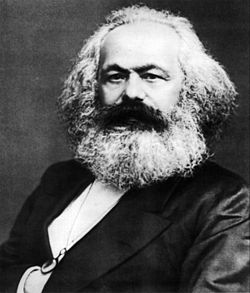International Workingmen's Association
The International Workingmen's Association (IWA; 1864–1876), often called the First International, was a political international which aimed at uniting a variety of different left-wing socialist, social democratic, communist,[2] and anarchist groups and trade unions that were based on the working class and class struggle. It was founded in 1864 in a workmen's meeting held in St. Martin's Hall, London. Its first congress was held in 1866 in Geneva. In Europe, a period of harsh reaction followed the widespread Revolutions of 1848. The next major phase of revolutionary activity began almost twenty years later with the founding of the IWA in 1864. At its peak, the IWA reported having 8 million members[3] while police reported 5 million.[4] In 1872, it split in two over conflicts between statist and anarchist factions and dissolved in 1876. The Second International was founded in 1889. St. Martin's Hall Meeting, London, 1864 On 28 September an international crowd of workers gathered to welcome the French delegates in St Martin's Hall in London. Among the many European radicals were English Owenites, followers of Pierre-Joseph Proudhon and Louis Auguste Blanqui, Irish and Polish nationalists, Italian republicans and German socialists.[5] One of the German socialists, a 46-year-old émigré journalist named Karl Marx, would play a decisive role in the organisation but did not speak at the meeting.[5] The positivist historian Edward Spencer Beesly, a professor at London University, was the chair.[5] The meeting unanimously decided to found an international organisation of workers. The centre was to be in London, directed by a committee of 21, which was instructed to draft a programme and constitution. Most of the British members of the committee were drawn from the Universal League for the Material Elevation of the Industrious Classes[6] and were noted trade-union leaders like Odger, George Howell (former secretary of the London Trades Council, which itself declined affiliation to the IWA, although remaining close to it), Cyrenus Osborne Ward and Benjamin Lucraft and included Owenites and Chartists. The French members were Denoual, Victor Le Lubez and Bosquet. Italy was represented by Fontana. Other members were Louis Wolff, Johann Eccarius.[7] This executive committee in turn selected a subcommittee to do the actual writing of the organisational programme—a group which included Marx and which met at his home about a week after the conclusion of the St. Martin's Hall assembly.[5] This subcommittee deferred the task of collective writing in favour of sole authorship by Marx who ultimately drew up the fundamental documents of the new organisation.[5] On 5 October, the General Council was formed with co-opted additional members representing other nationalities. It was based at the headquarters of the Universal League for the Material Elevation of the Industrious Classes at 18 Greek Street.[8] Internal tensionsAt first, the IWA had mostly male membership, although in April 1865 it was agreed that women could become members. The initial leadership was exclusively male. At the IWA General Council meeting on 16 April 1867, a letter from the secularist speaker Harriet Law about women's rights was read and it was agreed to ask her if she would be willing to attend council meetings. On 25 June 1867, Law was admitted to the General Council and for the next five years was the only woman representative.[9] CongressesHague Congress, 1872 The fifth Congress of the IWA was held from 2-7 September 1872 in The Hague, the Netherlands with 65 delegates attending. Though Bakunin's Alliance of Socialist Democracy had disbanded the previous year,[citation needed] Marx and Engels believed that the organisation still existed and was secretly plotting to control the IWA, resulting in the expulsion of Bakunin and members of the Alliance from the IWA.[10] After the suppression of the Paris Commune (1871), Bakunin characterised Marx's ideas as authoritarian and argued that if a Marxist party came to power its leaders would end up as oppressive as the ruling class they had fought against (notably, in Statism and Anarchy). In 1874, Marx wrote notes rebutting Bakunin's claims in this book, referring to them as mere political rhetoric without a theory of the State and without the knowledge of social class struggles and economic factors.[11] The Portuguese section was one of the first to evolve into a party structure. Debates to create a socialist party began in 1873[12] and the party was formed 10 January 1875. After 1872: two First Internationals The anarchist wing of the First International held a separate congress in September 1872 at St. Imier, Switzerland. The anarchists considered the expulsion of Bakunin and Guillaume as illegitimate and The Hague Congress as unrepresentative and improperly conducted. On 15–16 September 1872 at Saint-Imier, the Anarchist St. Imier International declared itself to be the true heir of the International. The Spanish Regional Federation of the IWA formed the largest national chapter of the anarchist bloc.[13] On the Iberian Peninsula, the conflict within the IWA was acutely felt, rapidly transforming the region into another battleground between the two factions. The General Council attempted to curb the Alliance’s influence through the new Madrid Federation and Portuguese internationalists. On the opposing side, the anarchists, who held complete control of the working-class movement in Spain, tried to recruit Portuguese socialists to the Alliance.[14] See also
Footnotes
Further readingPrimary sources
Secondary sources
External linksWikimedia Commons has media related to International Workingmen's Association. |
||||||||||||||||||||||||||||||||
Portal di Ensiklopedia Dunia














